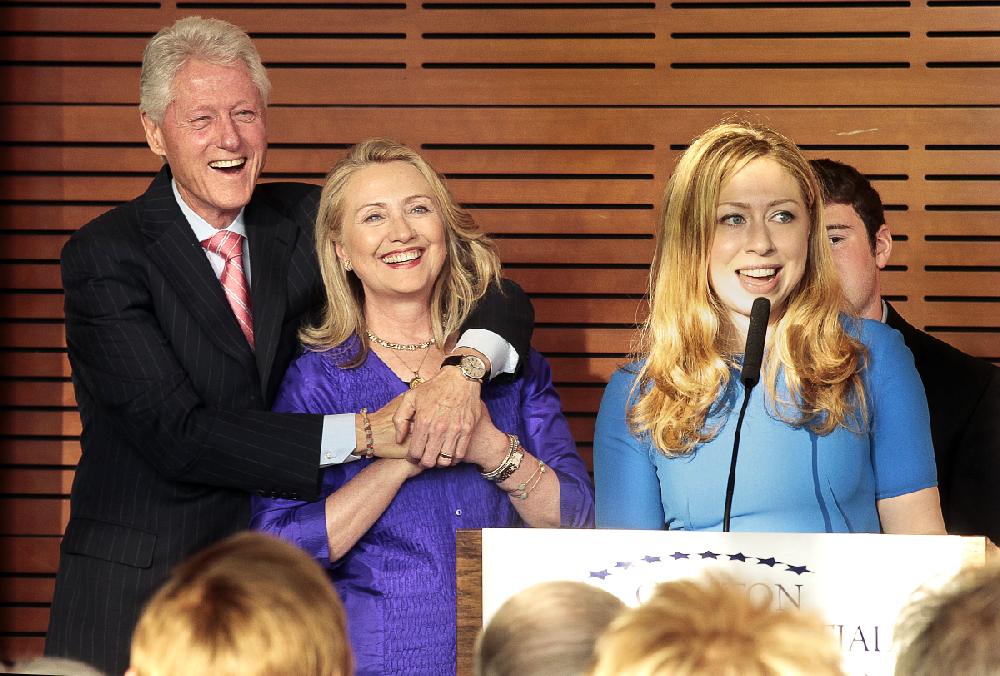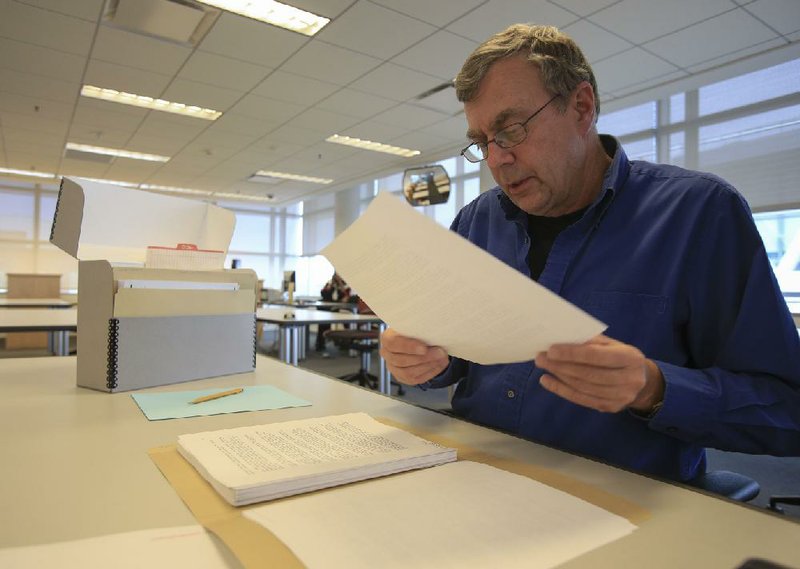WASHINGTON - The Clinton Presidential Center on Friday afternoon released an estimated 4,000 pages of previously sealed White House documents.

Clintons
The release came days after Politico reported that 33,000 records, some of them detailing advice given to then-President Bill Clinton and first lady Hillary Rodham Clinton by top aides, had not been released when they became public under federal law.
All but 8,000 of the sealed documents will be released in batches over the coming weeks, according to the U.S. National Archives and Records Administration.
Last month, national news outlets descended on Fayetteville to review documents from the Clinton presidential campaign that belonged to the late Diane Blair, a University of Arkansas political science professor and close friend of Hillary Clinton. But the documents released Friday were accessible on the library’s website.
As a result, only a few reporters and researchers were at the National Archives building on the grounds of the Clinton center in Little Rock to view them.
“I was expecting more of a scrum,” said Ron Blome, a television producer working for NBC News, after spending a couple of hours reviewing copies of the documents, contained in four small boxes. He noted that the network also had five other researchers in New York and Washington, D.C., reviewing the documents.
The documents were posted online at 12:02 p.m. and also made available at the library in Little Rock. Within 10 minutes, online access to the Clinton library slowed to a crawl as traffic increased. Later, the website crashed. One archivist attributed the crash to heavy use of the website. A spokesman for the National Archives in Washington said the agency’s “technical team needed to make two minor software fixes, and they went smoothly.”
Another researcher present Friday, who also was at the University of Arkansas last month to review Blair’s records, said she worked for AmericaRisingPAC.org, a political action committee set up last year to, in its words, “expose the truth about Democrats through video tracking, research, and the media.”
Its treasurer is former Mitt Romney campaign manager Matt Rhoads, according to Federal Election Commission documents.
The researcher’s appearance underscores the political lens through which the documents will be viewed and analyzed: How they affect Hillary Rodham Clinton, the former first lady, U.S. senator, secretary of state and 2008 presidential candidate who is thought to be weighing a 2016 White House bid.
The batch of documents released Friday range from aides urging Hillary Clinton to make a cameo appearance on the sitcom Home Improvement in 1995 to strategy on how to sell Republicans on her health-care plan.
The papers are separated into 18 groups on the website by topic, such as the Commonwealth of Northern Mariana Islands; Hillary Rodham Clinton on Children’s Issues and Women’s Rights; and [Press Secretary] Lissa Muscatine, First Lady’s Press Office. Sprinkled throughout are doodles and handwritten notes.
They are available online at http://clintonlibrary.gov/formerlywithhelddocuments.html
Other interesting items in the records include:
In a memorandum about the 1994 State of the Union, an aide referred to as “Todd” cautioned against promising that people could choose or keep their doctors under the president’s proposed healthcare plan. A similar promise was made by President Barack Obama nearly two decades later.
“This sounds great and I know that it’s just what people want to hear. But can we get away with it? … I am very worried about getting skewered for over-promising here on something we know full well we won’t deliver,” it states.
A memorandum written by Bill Clinton speechwriter Jeff Shesol suggesting that Clinton aide (and current Chicago Mayor) Rahm Emanuel had low regard for the National Rifle Association and its president, Charlton Heston. Before the June 1998 signing of a bill on bullet-resistant vests, Shesol said Emanuel had indicated precisely where Heston could “shove it.”
A 1993 health-care strategy memorandum suggests a way to sway public opinion on the health-care bill is to encourage “particular Committees to hold substantive hearings focusing on the negative traits of interest groups who will be opposed to health reform.” It also encouraged the first lady, who was leading the effort to overhaul health care, to send thank-you notes to members of Congress after meeting with them.
A 1993 memorandum on informing Congress about the Clintons’ health-care plan notes “Other members, in particular Senator [David] Pryor [D-Ark.], have repeatedly emphasized the need to have designated (and Administration-educated) advocates situated throughout the country to serve as credible ‘talking heads’ to combat the predictable organized opposition that the Administration and nervous Congresspersons face.”
A 1999 memorandum in which adviser Mandy Grunwald urges Hillary Clinton to be chatty, be funny and “don’t be defensive” during a tour of New York before her U.S. Senate bid.
“The press is obviously watching to see if they can make you uncomfortable or testy. Even on the annoying questions, give relaxed answers,” the memorandum states.
Some of the documents detail how difficult it was to try to pass sweeping healthcare legislation. The Clintons’ effort fizzled in 1994 after encountering sweeping opposition.
In a September 1993 appearance before Senate and House leaders, Hillary Clinton said changes that harmed those who already had health insurance would be rejected.
“The president [Bill Clinton], from the very beginning, has said to us, this plan cannot leave people who are insured worse off,” she said.“This plan has to leave them either the same or better off than they would be if the current system continued … and if they know that, by bringing in 40 million uninsured, they are not sacrificing too much.”
Critics have long complained about delays in the release of Clinton-era documents.
Judicial Watch, a conservative anti-Clinton organization, believes that the National Archives dragged its feet in releasing the documents because of the chance Hillary Clinton will run for president, said the group’s president, Tom Fitton.
“Many Americans are going to be interested about details of the Clinton administration and what it might portend for a new Clinton administration,” Fitton said. “One of the scandals of the presidential library system is that often the federal employees working at the libraries see themselves as advocates for the president whose records they are archiving.”
Professor Russell Riley, who leads the William J. Clinton Presidential History Project at the University of Virginia, said while the Presidential Records Act allowed public access to the documents last year, the archivists were waiting for clearance from the current and former president that the pages didn’t inadvertently contain sensitive information that needed to be withheld in the national interest.
That clearance is also mandated in the act.
“They followed the necessary procedures,” he said. “The mere fact that a document is ready for release doesn’t mean you can open it.”
He said people need to understand it takes so long for the documents to come out because there aren’t enough archivists. He pointed to the George H.W. Bush Presidential Library where he said about 20 percent of all documents are available nearly 20 years after it opened.
“It’s not politics,” he said. “The files are not secret because the Clintons have been sitting on top of them. The fundamental problem is that there is virtually no archival staff available to process presidential records.”
Riley, whose work focuses on contemporary presidential history, questioned how much the new papers would reveal, saying past document releases didn’t contain much the public didn’t already know.
He had not yet seen the most recent documents.
He said it isn’t surprising to hear that Hillary Clinton was involved in shaping policy or that the first lady was angry about her husband’s affair with Monica Lewinsky.
“There’s a lot of stuff that adds color to our understanding, but I don’t know that there is much that is genuinely new that would make you stop,” Riley said. There is no “‘eureka’ moment that tells me we have to go back and completely re-evaluate our perspective of her as first lady.”
Judicial Watch’s Fitton said numerous groups will comb through the documents. Judicial Watch sued the library in 2007 for not releasing records related to the health-care effort.
“We’ll be reviewing [the documents] just like every other interested party in Washington will be,” Fitton said. “As a critic of the Clinton administration and the Clintons’ personal ethics, we’ll have an interest in that category of information especially.”
Front Section, Pages 1 on 03/01/2014
